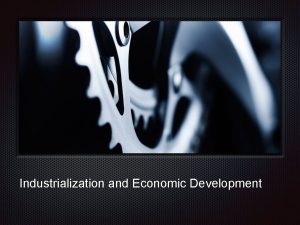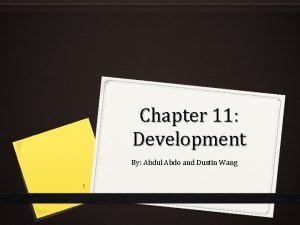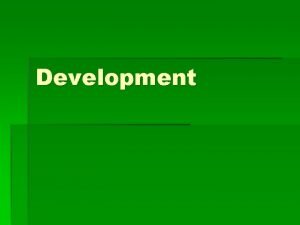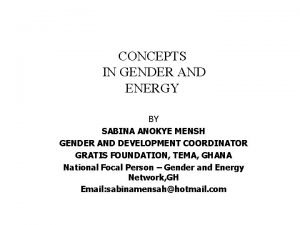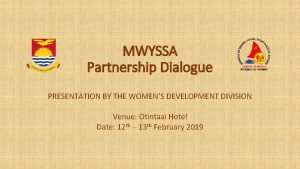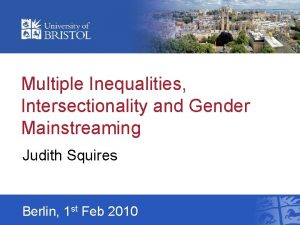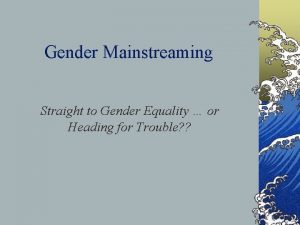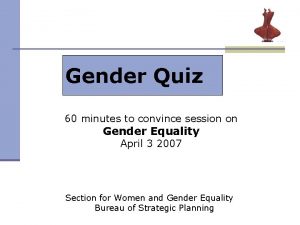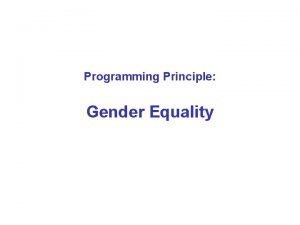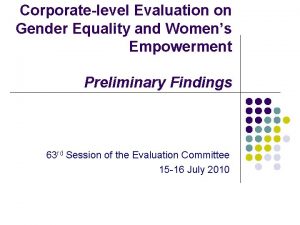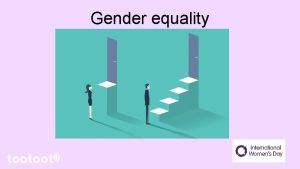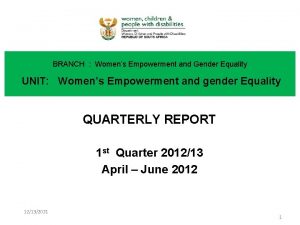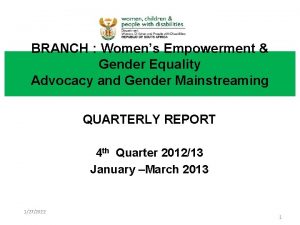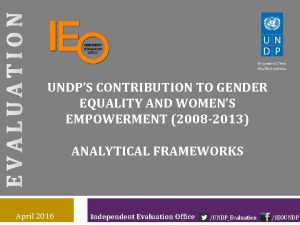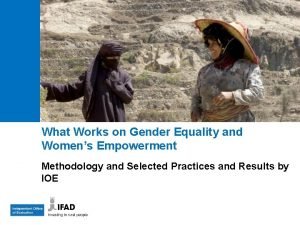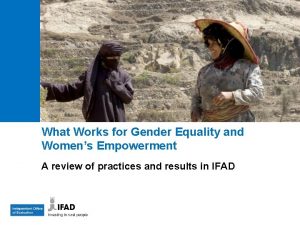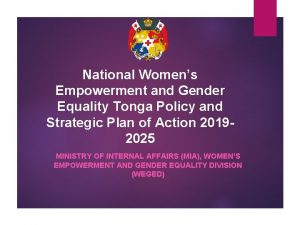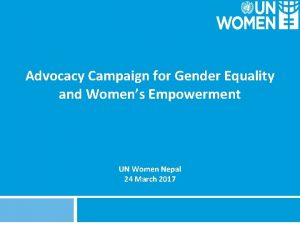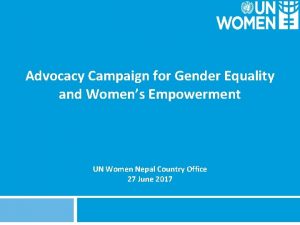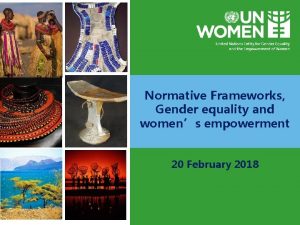Corporatelevel Evaluation on Gender Equality and Womens Empowerment












- Slides: 12

Corporate-level Evaluation on Gender Equality and Women’s Empowerment Preliminary Findings 63 rd Session of the Evaluation Committee 15 -16 July 2010

Background l IFAD adopted a Gender Plan of Action (2003 -2006), approved by the Board in April 2003 l In July 2008, the Programme Management Department issued a Framework for Gender Mainstreaming l In October 2009, IFAD received the Global MDG 3 Champion Torch l This is the first corporate-level evaluation on gender by the Office of Evaluation 2

Evaluation Objectives l What IFAD’s corporate strategy says about gender equality and women’s empowerment (consistency, relevance) and how effectively has it been reflected in country strategies and projects? l What results have actually been achieved on the ground in promoting gender equality and women’s empowerment? l Generate a series of findings and recommendations for IFAD’s future activities related to gender equality and women’s empowerment 3

Process l Desk work including: (i) review of corporate strategy documents; (ii) metaevaluation of existing evaluative evidence; (ii) review of recently approved COSOPs and projects; (iii) assessment of IFAD’s internal corporate processes; and (iv) benchmarking exercise. l Five country visits to Bangladesh, Egypt, Guatemala, Mauritania and Zambia l Presentation of preliminary findings to Management and the Evaluation Committee in July ’ 10 l Preparation of draft final report l Stakeholders’ workshop, 27 -28 Sep ’ 10 (first of its kind) l Evaluation Committee (26 November) and Executive Board (15 -16 December) discussions 4

Preliminary Findings Corporate strategy and its implementation l There is a general consensus among the Board, Senior Management and staff of the importance in promoting gender equality and women’s empowerment for sustainable agriculture and rural development l IFAD’s corporate strategy on paper is broadly relevant and consistent (dispersed among numerous documents + experience-based) l Is IFAD walking the talk? The translation of strategy into action has not been entirely adequate (e. g. , administrative budget allocation, HR capacity building, monitoring & reporting, incentives, accountability, communication, etc) 5

Preliminary Findings Corporate strategy and its implementation l Specific, earmarked investments favoring gender and women’s empowerment in operations is difficult to aggregate and not systematic across the portfolio l There does not appear to be a common understanding of: (i) related terminology: gender equality, gender equity, gender mainstreaming, women’s empowerment; and (ii) causes and dynamics of the gender problematic, leading to a wide range of solutions pursued 6

Preliminary Findings Results from past operations and current portfolio l Overall, performance of past projects is only moderately satisfactory, but highly variable across projects and countries, and not always context specific l Introduction of innovative solutions to gender in past operations was moderately unsatisfactory. There are few examples of scaling up l Gender equality and women’s empowerment issues increasingly incorporated in recent COSOPs and projects 7

Preliminary Findings Corporate Processes l There is neither incentive for excellence in this area, nor consequence for staff who give low or no priority to the issue l Staff work planning and performance assessments is not results-oriented in terms of gender achievements. Compliance culture predominant l Change in gender-balance in workforce is very slow, with the exception of recent efforts at a very senior level. 6 of 23 mission members were women (26%) in the 5 COSOPs reviewed in 2009, and only 2 gender experts. 24 of 124 mission members were women (19%) in 21 projects approved between 2003 -2009, and only 6 gender experts. 8

Preliminary Findings Corporate processes l Formal gender-friendly HR policies are in place, but organizational culture does not encourage women or men who challenge traditional workplace practices l IFAD’s results framework, strengthened quality enhancement and quality assurance, shift to country presence and direct supervision are paying more attention to gender equality and women’s empowerment l Learning and knowledge on gender is not pulled together, nor is progress systematically monitored and reported 9

Preliminary Findings Corporate Processes l Funding for specific gender work (thematic studies, self assessments, HQ capacity building, etc) has depended heavily on supplementary funds and TAGs l Gender desk in Policy and Technical Advisory division does not have earmarked annual administrative budget to support work plan and corporate strategy l Corporate capacity through divisional Gender Focal Points is inadequate l Gender Thematic Group is mainly a platform for exchanging information, but has no coherent annual work plan, targets, budget, etc. 10

Preliminary Conclusions l IFAD is in principle well positioned, because of its mandate and strategy to become a global leader in this area for agriculture and rural development l The corporate strategy is largely relevant and consistent, but not adequately translated into action l Performance in the past however has been only moderately satisfactory and variable, even though more recent country strategies and operations show improvements l Investments in gender-related work both in IFAD-funded operations and at HQs is difficult to track and unsystematic. Heavy reliance on supplementary funds and TAGs l Learning and accountability framework to promote gender equality and women’s empowerment is inadequate. Compliance rather than results culture prevalent 11

Preliminary Recommendations l IFAD should develop a corporate gender policy to consolidate its strategy and approaches l Innovation and scaling up on gender should be an integral feature of COSOPs and projects, as a means to achieve wider impact on rural poverty l Executive Board and Senior Management need to more actively monitor and report progress on gender equality and women’s empowerment l Apply a results-oriented work planning and performance management system with incentives and accountability, in order to shift from compliance to impact achievement l Invest specifically in knowledge management on gender, appoint a Champion in the Senior Management on gender, and strengthen decentralized technical advice to operations 12
 Quinary industry
Quinary industry Gender empowerment measure
Gender empowerment measure Gender empowerment measure
Gender empowerment measure Gender empowerment measure
Gender empowerment measure Dustin rozier model
Dustin rozier model Simple definition of development
Simple definition of development Strategic gender needs and practical gender needs
Strategic gender needs and practical gender needs Gender equality is more than a goal in itself
Gender equality is more than a goal in itself Rhetorical questions about gender equality
Rhetorical questions about gender equality Gender equality definition
Gender equality definition What is gender equality answer
What is gender equality answer Methodology of gender equality
Methodology of gender equality Merits of kothari commission
Merits of kothari commission


